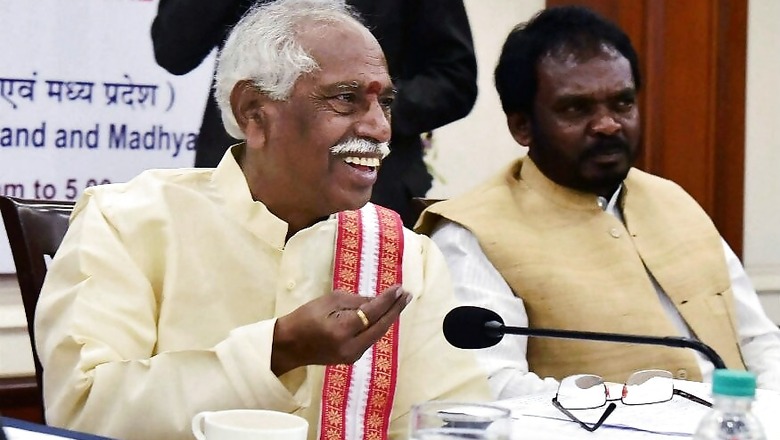
views
New Delhi: Sangh Parivar’s own trade union Bharatiya Mazdoor Sangh (BMS) has slammed the Union government’s new labour law amendment as a “thoughtless move” that will only help in further “exploitation of the entire working class in the country”.
The Lok Sabha on Tuesday passed the Payment of Wages (Amendment) Bill, 2017, which mandates payment of all salaries under Rs 18,000 only through cheque or digital transactions.
“This is only a thrust for Prime Minister Narendra Modi’s Digital India campaign and workers should not pay for such a mission,” Pawan Kumar, North Central Zonal Secretary of BMS, told News18.
Kumar was one of the many stakeholders who were consulted by labour minister Bandaru Dattareya before the amendment was finalised.
He, however, expressed “relief” that the Factories Amendment Bill that was passed last year in the Lok Sabha had only amended the provision relating to extending the overtime working hours of an employee and had left alone the clause which permits woman to work at night.
His rationale: Women should not work in night shifts.
“This amendment has not been incorporated in the factories bill. It is good that it has not been included. It is unconstitutional, illegal, unethical and immoral in the context of India. Women cannot work in night shifts and is not allowed,” said Kumar.
Kumar alleged that demands to include women in the workforce are raised by “the so-called NGOs and so-called intellectuals who are financed by foreign funds.”
“This is not America, this is India. Indian women manage the entire home and if she works at night, how will she manage? Here children don’t stay in child care homes and elderly are not sent to old age homes. The entire family structure will collapse in India. Here women are not safe during the day, then imagine what will happen at night,” said Kumar.
Kumar acknowledged women do work at night in India whether it is call centres or the military or the hospitals.
“There is no prohibition on females to work at night as seen in hospitals, police, army, etc. No one stops them, but there should be no law specially permitting them to work at night,” said Kumar.
The BMS leader wondered if Finance Minister Arun Jaitley had undergone a “sudden mood change” to include labour reforms in the Budget.
“On December 30, 2015, in the presence of Bandaru Dattareya and me, Jaitely had said that Indian labour laws do not need any reform,” said Kumar.
Kumar said that the Finance Minister had no business in talking about legislative reforms in the Labour ministry, and by doing so, he was interfering with the affairs of another ministry.
The latest bill passed today will replace the Payment of Wages (Amendment) Bill 2016, which was introduced in Lok Sabha on December 15, 2016 and also seeks to repeal the Payment of Wages (Amendment) Ordinance 2016 promulgated on December 28, 2016.
“To withdraw money, an employee has to take a leave from work and many employers would not be willing to give leave to an employee just to visit a bank and withdraw money. Banks deduct commission on withdrawal and an amount above Rs 2,000 has a commission of 0.5%, which leads to a loss of Rupees 50. Is that not a loss? It’s an impractical decision without proper consultation and thought,” said Kumar.
“This ordinance will also lead to workers being exploited. Management will now stop keeping workers on the rolls because if kept on the rolls then bank accounts have to be opened and the salary being paid will be registered. In the budget itself Jaitely said that almost 6 lakh companies do not file IT returns. So here the government fails to nab them but on the other side you are pressurising the workers to get salary in bank accounts,” he said.
“Under Payment of Wages act, maximum fine is of Rs 50, and it is irrelevant in the present context and it demands a review. Look at the minimum wages in the payment of wages act, it has an upper ceiling of Rs 18,000 and hence it is irrelevant now which again needs a review. Even Bonus Act and Industrial Disputes Act needs to be reviewed. According to the Industrial Disputes Act, there is no workman in India at the moment because the upper ceiling for the compensation of a workman is Rs 1,600 and hence it needs review,” said Kumar.
While presenting the union budget on February 1, the Finance Minister had stated that legislative reforms will be undertaken to simplify, rationalise and amalgamate the existing labour laws into four codes on (i) wages; (ii) industrial relations; (iii) social security and welfare; and (iv) safety and working conditions.
But Kumar believed that the proposal of codification was dicey and has an “uncertain future.”
“Only two codes of have been drafted till now. The IR code and Wage code has been drafted till now and the other two codes including Social Security and Welfare have not even been drafted. Even the two drafted codes do not have cabinet approval and there is no confirmation on the approval by the law ministry. There have been no stakeholder consultations either on the yet to be drafted codes,” said Kumar.



















Comments
0 comment